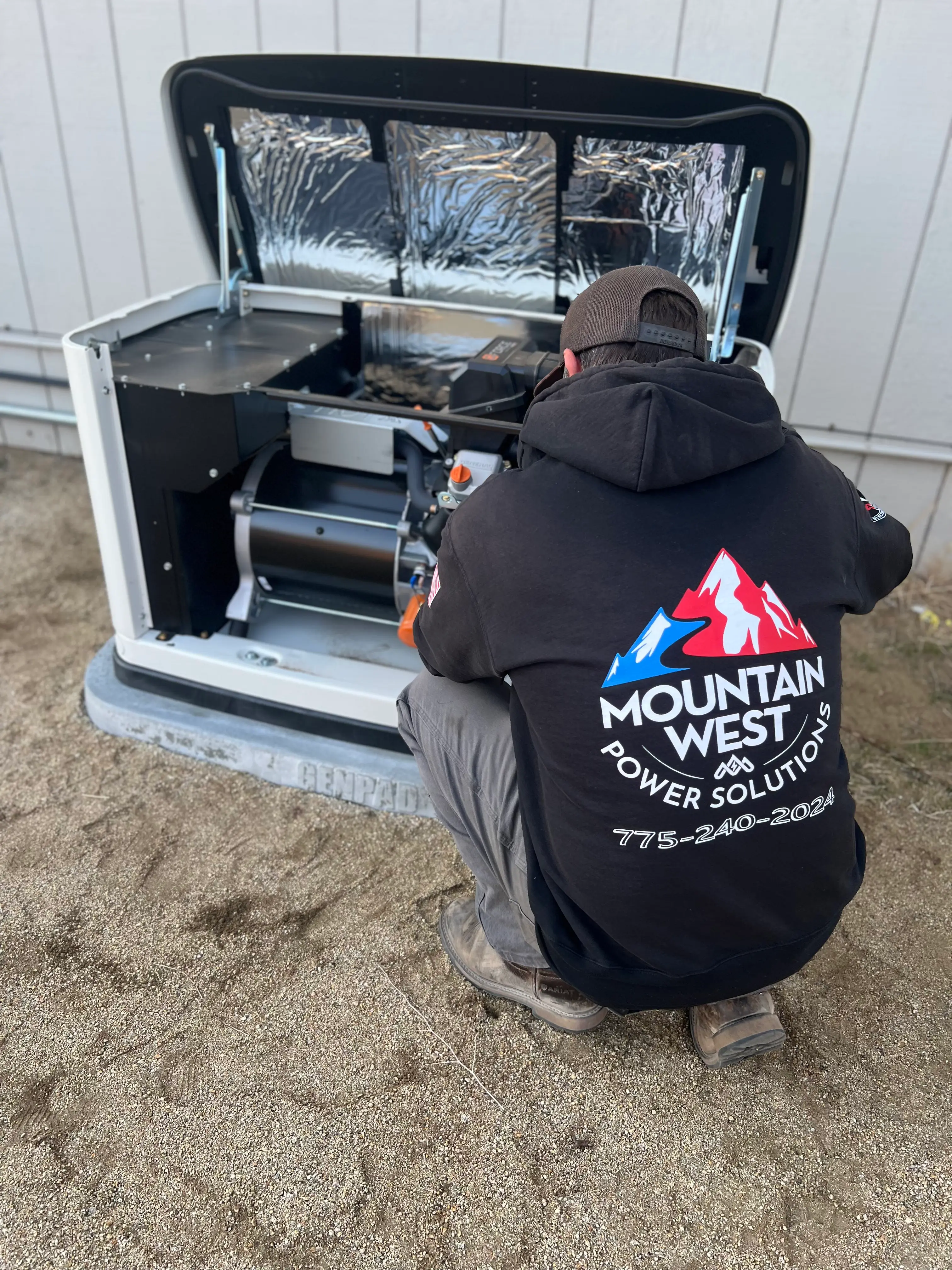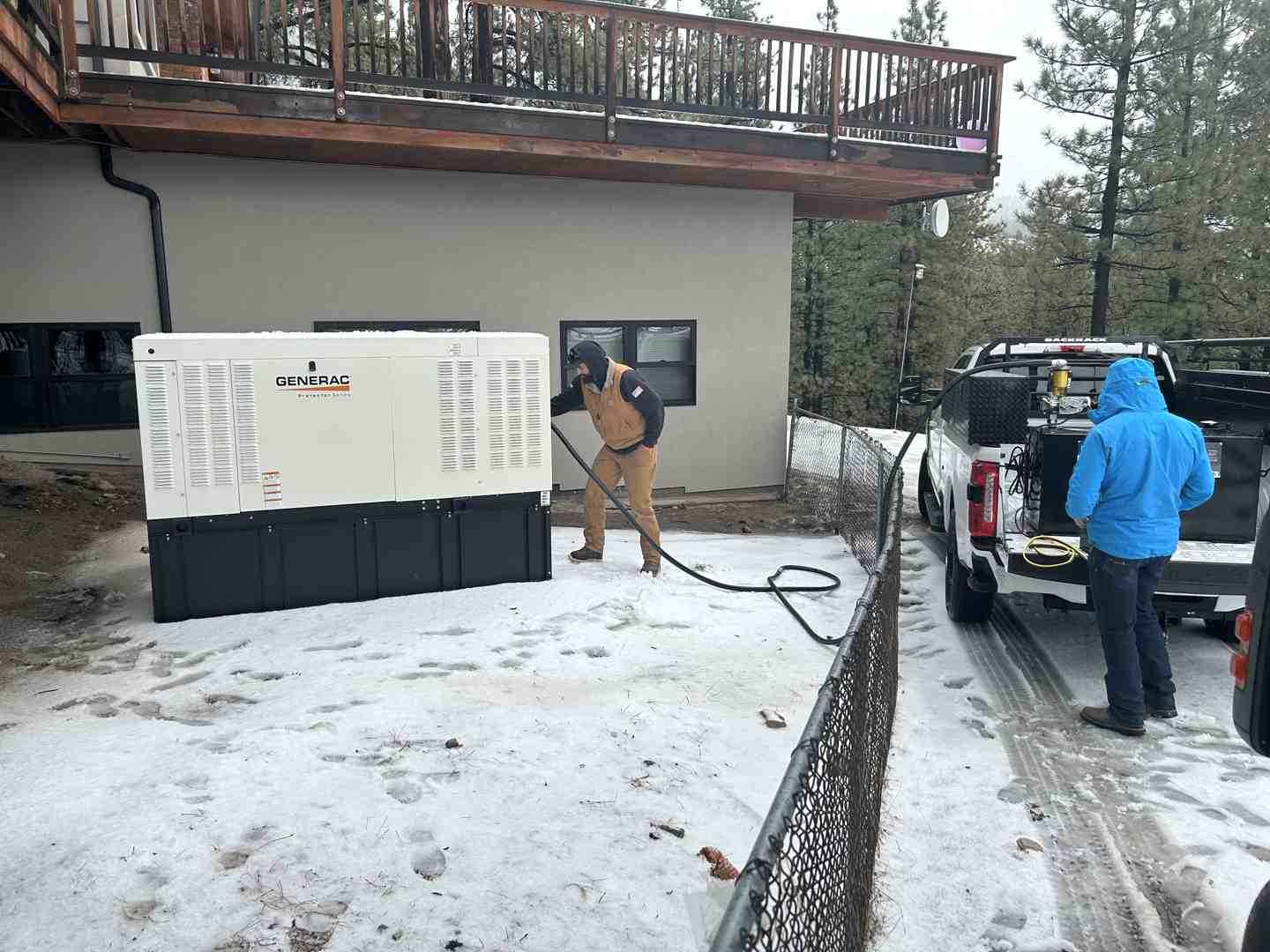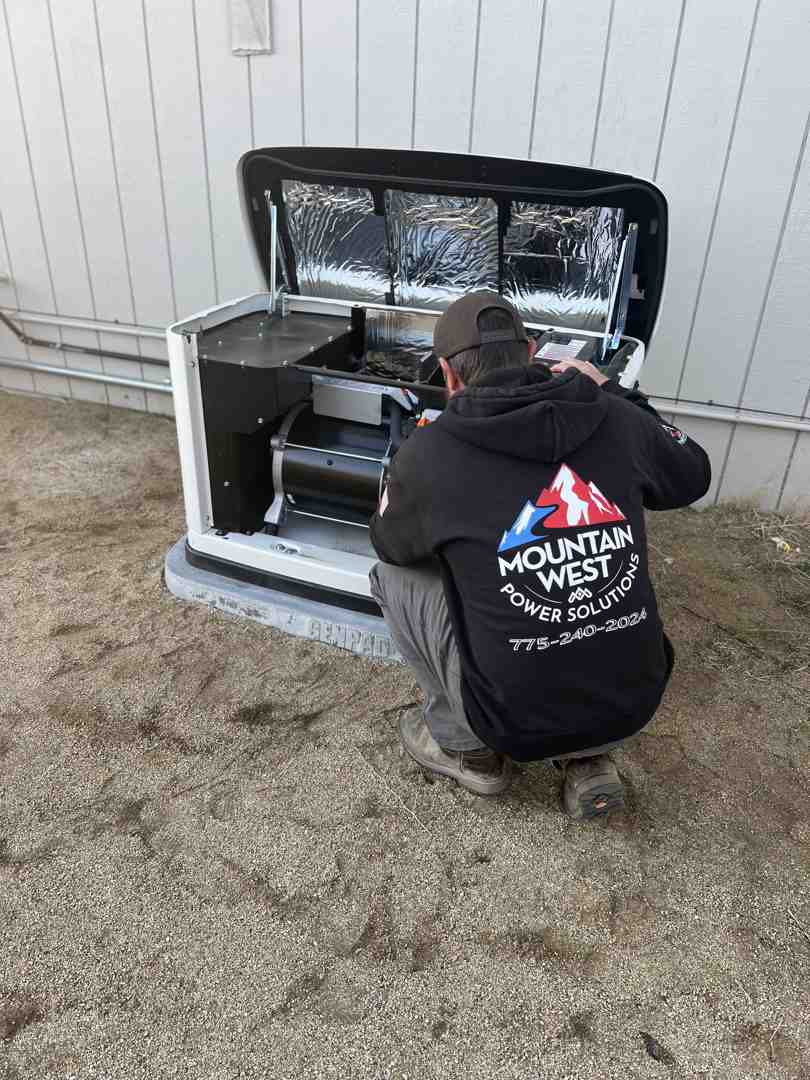When the lights go out, a backup generator can be the difference between staying comfortable and dealing with spoiled food, no heat, and disrupted daily life. Many homeowners wonder if they really need to hire a licensed generator installer or if they can tackle this project themselves.
Hiring a licensed technician ensures your generator installation meets safety codes, performs reliably when you need it most, and protects your investment with proper setup the first time. Choosing a licensed generator installer means your generator installation will be done right, maximizing safety, code compliance, and long-term reliability.
Generator installation is not just about convenience; it’s about ensuring your home’s electrical system is protected and your family stays safe. The expertise of a licensed generator installer is invaluable for these reasons.
The peace of mind that comes from knowing your backup power system will work correctly when you need it most makes the investment in professional installation worthwhile.
In this article, you’ll learn how a licensed generator installer ensures safe, code-compliant, and reliable backup power for your home. Below, we’ll walk through each important aspect:
- What a licensed generator installer actually does
- Who can install your home generator?
- What to expect during professional generator installation
- Generator installation costs and permitting
- Why homeowners in Northern Nevada choose Mountain West
Keep up! By hiring a licensed generator installer, you avoid costly mistakes and ensure your generator installation is both safe and effective.
What a licensed generator installer actually does
Licensed generator installers handle complex electrical work that goes far beyond basic wiring. They ensure your generator meets local building codes, obtain proper permits, and create safe connections that protect your home and family. Generator installation by a licensed generator installer guarantees compliance with all regulations and provides the highest level of safety for your home.
The difference between DIY setup and professional installation
A licensed technician brings specialized tools and training that most homeowners lack. They understand load balancing, which means they know exactly how much power your home needs and how to distribute it safely. Generator installation done by a licensed generator installer eliminates risks associated with improper setup and ensures your system functions as intended.
Professional installers connect your generator to a transfer switch. This device automatically starts your generator when the power goes out. It also prevents dangerous backfeed that could hurt utility workers. Generator installation is much more than a simple wiring job; a licensed generator installer ensures every detail is handled professionally.
DIY installations often miss critical steps. Homeowners might skip grounding requirements or use the wrong wire sizes. These mistakes can cause fires, equipment damage, or electrical shock. Generator installation by an unqualified person is never recommended; always trust a licensed generator installer for the job.
Licensed installers follow manufacturer specifications exactly. They test every connection and verify proper operation before leaving your property.
Why code compliance and permits matter
Local building codes exist to protect you and your neighbors. A certified electrician knows these rules and follows them during installation. Generator installation without proper permits can lead to fines, failed inspections, or voided insurance. A licensed generator installer ensures your project is fully compliant.
Permits ensure proper inspections happen. Most areas require permits for generator installations. Licensed technicians handle the paperwork and schedule required inspections. Generator installation by a licensed generator installer means all documentation and approvals are handled for you.
Code compliance affects your insurance coverage. If an unpermitted installation causes damage, your insurance company might deny your claim. This could cost thousands of dollars.
Proper setbacks from windows and property lines prevent carbon monoxide poisoning. Licensed installers know exactly where to place your generator for maximum safety.
How certified electricians ensure safety and reliability
Certified electricians test your electrical system before installation. They check your main panel capacity and identify potential problems that could affect generator performance. Generator installation by a certified professional ensures your system will operate safely during any outage.
Ground fault protection prevents electrical shock. Licensed technicians install proper grounding systems that meet current safety standards.
They also program your transfer switch correctly. This ensures your generator starts automatically and switches power seamlessly during outages.
Regular maintenance schedules keep your system running. Many licensed installers offer service contracts that include oil changes, filter replacements, and system testing.
Who can install your home generator?
Not all contractors are certified electricians to install your home generator safely. Licensed generator contractors have the training and credentials to handle complex electrical work, while unlicensed installers create serious safety risks. Generator installation should always be performed by a licensed generator installer for maximum safety and efficiency.
Can any electrician install a generator?
Most certified electricians can handle basic generator installations. They understand electrical codes and safety requirements. However, generator installation requires specialized knowledge beyond standard electrical work. Generator installation by a licensed generator installer ensures all components are connected and configured correctly.
Generator systems involve complex components like transfer switches and load balancing. These systems must connect to your home's main electrical panel. The installation affects your entire electrical system.
Key requirements for generator installers:
- Valid electrical contractor license
- Generator-specific training certification
- Knowledge of local building codes
- Experience with transfer switch installation
Some electricians focus only on basic wiring work. They may lack experience with standby generator systems. Always verify that your electrician has generator installation experience before hiring them. Choosing a licensed generator installer is the best way to ensure your generator installation is safe and reliable.
Why licensed generator contractors are the safer choice
A licensed generator contractor brings specialized expertise to your project. They understand manufacturer requirements and local code compliance. This knowledge prevents costly mistakes and safety hazards. Generator installation by a licensed generator installer offers warranty protection and peace of mind.
Generator contractors have to carry proper insurance coverage. If something goes wrong during installation, you have protection. They also provide warranties on their work.
Benefits of hiring licensed professionals:
- Proper permits and inspections
- Code-compliant installation
- Manufacturer warranty protection
- Insurance coverage for damages
- Ongoing support and maintenance
Licensed contractors follow strict installation procedures. They test all connections and safety systems before completing the job. This thorough approach ensures your generator works when you need it most. For the safest generator installation, always hire a licensed generator installer.
Understanding the risks of unlicensed or unverified work
Unlicensed installers create serious dangers for your home and family. Improper connections can cause electrical fires or carbon monoxide poisoning. These risks far outweigh any cost savings. Generator installation should never be left to unverified individuals; always choose a licensed generator installer.
Common problems with unlicensed work:
- Faulty electrical connections
- Improper grounding systems
- Code violations that fail inspection
- Voided manufacturer warranties
- No insurance protection
Insurance companies may deny claims for damage caused by unlicensed work. Your homeowner's policy requires professional installation for coverage. The financial risk of using an unlicensed installer is enormous.
Local authorities can force you to redo improper installations. This means paying twice for the same work. Professional installation protects your investment from the start. Generator installation by a licensed generator installer is the safest and most cost-effective choice.
What to expect during professional generator installation
Professional generator installation follows a structured process that ensures your system works safely and efficiently. Licensed electricians handle everything from evaluating your property to connecting the generator to your electrical panel and conducting final tests. Generator installation by a licensed generator installer guarantees every step is completed to the highest standard.
Site evaluation, system sizing, and load calculations
The first step involves a thorough site evaluation of your property. We examine your home's electrical needs and available space for the generator unit. Generator installation begins with careful planning by a licensed generator installer to ensure optimal placement and performance.
Our electricians perform detailed load calculations to determine how much power your home requires. This includes measuring the electrical demands of essential appliances like refrigerators, heating systems, and lights.
System sizing depends on these calculations. A typical home might need a 10kW to 24kW generator, but larger homes with more electrical loads require bigger units.
The EPA recommends that critical facilities (such as utilities) regularly conduct power assessments—including load calculations and siting evaluations—and install stationary generators with automatic transfer switches to maintain operation during outages, highlighting the importance of expert planning and installation by licensed professionals.
We also check for proper clearances from windows, doors, and air intake vents. Local codes require specific distances between the generator and your home's structure.
The evaluation includes reviewing your existing electrical panel capacity. Some homes need panel upgrades to handle the automatic transfer switch installation.
Connecting the generator to your home's electrical panel
Licensed electricians install an automatic transfer switch that connects your generator to your electrical panel. This switch detects power outages and starts the generator automatically. Generator installation by a licensed generator installer ensures all electrical connections are secure and compliant.
The connection process requires running electrical conduit from the generator to the transfer switch. We ensure all wiring meets local electrical codes and safety standards.
Gas connections need a licensed gas fitter who connects your natural gas line or propane tank to the generator. This step must follow strict safety protocols to prevent gas leaks. Generator installation often involves collaboration between a licensed generator installer and a licensed gas fitter.
Key electrical connections include:
- Generator to transfer switch wiring
- Transfer switch to main electrical panel
- Grounding connections for safety
- Control wire installation
The automatic transfer switch monitors your utility power constantly. When an outage occurs, it switches your home's power source from the utility to the generator within seconds.
Final inspections, testing, and customer walkthrough
Local authorities inspect the installation to verify code compliance. This inspection covers electrical connections, gas lines, and proper clearances around the unit. Generator installation by a licensed generator installer passes all required inspections and provides peace of mind.
We conduct comprehensive testing of all systems before completing the job. This includes starting the generator, checking the automatic transfer switch operation, and verifying proper voltage output.
The customer walkthrough teaches you how to operate your new generator system. We explain the control panel, maintenance requirements, and emergency shutdown procedures.
Testing checklist includes:
- Generator startup and shutdown cycles
- Automatic transfer switch timing
- Voltage and frequency measurements
- Gas flow and pressure verification
We provide you with all warranty information and maintenance schedules. Most generators need service every six months or after a certain number of operating hours.
Generator installation costs and permitting
Professional generator installation involves significant upfront costs that vary based on your home's specific needs and local requirements. Most installations require permits and inspections to ensure safety and code compliance. Generator installation by a licensed generator installer includes handling all permitting and inspection requirements for you.
How much does it cost to have someone install a generator?
The total cost for professional whole-home generator installation typically ranges from $7,000 to $15,000. This price includes both the generator unit and professional installation services. Generator installation by a licensed generator installer is a valuable investment in your home's safety and comfort.
Installation labor fees alone usually cost between $2,000 and $5,000. The exact amount depends on your home's electrical setup and fuel source requirements.
Several factors affect the final price:
- Generator size and type - Larger units cost more to install
- Electrical work complexity - Panel upgrades add significant costs
- Fuel source setup - Natural gas lines or propane tank installation
- Site preparation - Concrete pad and proper clearances
- Local permit fees - Varies by municipality
We recommend getting quotes from multiple licensed contractors. This helps you understand the typical pricing in your area and avoid overpaying. Generator installation costs may vary, but hiring a licensed generator installer ensures you get quality service and results.
Factors that impact total installation pricing
Installation costs vary significantly based on your home's unique requirements. We see the biggest price differences in these key areas.
Electrical system upgrades often represent the largest cost factor. Older homes may need panel upgrades or new transfer switches. These electrical modifications can add $2,000 to $4,000 to your project.
Fuel source preparation creates another major cost variable. Natural gas line installation typically costs $500 to $2,000. Propane systems may require tank installation and gas line work.
Site accessibility affects labor time and equipment needs. Difficult-to-reach locations increase installation complexity and costs. Some installations require crane services or special equipment.
Local code requirements can drive up costs in certain areas. Some municipalities require specific setbacks, sound barriers, or additional safety equipment.
Do you need a permit to install a home generator?
Most municipalities require permits for standby generator installations. We strongly recommend checking with your local building department before starting any work. Generator installation by a licensed generator installer includes all permit applications and necessary paperwork.
According to the EPA, emergency power generator underground storage tank (UST) systems installed after October 13, 2015 must comply with comprehensive federal release detection, spill protection, and corrosion control requirements under Subpart D—ensuring safer fuel storage and system integrity during installation and operation.
Permit requirements vary by location but typically include:
- Building permits for electrical work
- Gas permits for fuel line connections
- Inspection requirements during and after installation
Permit costs usually range from $50 to $500 depending on your local fees. Some areas charge separate fees for electrical and gas permits.
Licensed contractors typically handle permit applications and scheduling inspections. This service is included in most professional installation quotes. Generator installation by a licensed generator installer ensures you stay compliant and avoid fines.
Working without proper permits can result in fines and insurance complications. Many insurance companies require permitted installations to honor warranty claims.
Why homeowners in Northern Nevada choose Mountain West
Mountain West stands out as the preferred generator installer in Northern Nevada through fully licensed operations, transparent pricing practices, and a proven track record of customer satisfaction across the region.
Our commitment to professional service and honest communication has earned the trust of homeowners throughout Reno and Sparks. Generator installation by our team of licensed generator installers guarantees quality and satisfaction.
Fully licensed and insured generator installation services
We maintain all required Nevada contractor licenses and carry comprehensive insurance coverage for every generator installation project.
Our team holds proper electrical licensing and stays current with local building codes. Generator installation by a licensed generator installer ensures your home is protected and your investment is secure.
Insurance protections include:
- Workers' compensation coverage
- General liability insurance
- Property damage protection
- Professional liability coverage
Licensed installers like our team must meet strict state requirements. We handle all permit applications and inspections required by Northern Nevada municipalities. Generator installation by a licensed generator installer means your project is always up to code and fully insured.
Our insurance coverage protects homeowners from potential liability during installation. This protection extends to any work-related injuries or property damage that might occur on your property.
Transparent estimates and honest recommendations
We provide detailed written estimates that break down all costs before any generator installation work begins. Our recommendations focus on matching generator systems to your actual power needs rather than selling the most expensive generator option.
As a trusted generator installation company, we believe in transparency at every step of your generator installation project.
Each generator installation estimate includes:
- Equipment costs
- Installation labor
- Permit fees
- Timeline expectations
We explain why specific generator sizes work best for different home types. Our team visits your property to assess electrical panels and determine optimal generator placement locations. Generator installation is tailored to your unique needs, ensuring you get the best generator installation experience possible.
No hidden fees appear after we start generator installation work. We discuss any potential complications upfront and explain how they might affect the final generator installation cost. Our honest approach makes us a leading generator installation company in the area.
Financing options with Mountain West
Financing is designed to make a whole-home solution attainable without compromising safety or scope.
Through our partner Synchrony, Mountain West offers promotional plans that include 0% interest for 18 months on qualifying system installs. Eligible scopes typically cover the generator, a service-rated automatic transfer switch, pad and anchoring, electrical integration, gas line coordination (NG/LP), permitting, start-up/commissioning, and the first load-test, so you’re not piecemealing critical items later.
We also finance Generac projects and can include accessory upgrades (cold-weather kits, remote monitoring, sound abatement, or a maintenance plan) in the same application when permitted.
Pre-qualification is quick and usually starts with a soft inquiry to estimate the terms you’re likely to receive before any hard pull occurs at final approval.
Your proposal will show the full project total and the lowest monthly payment available under current promos, so you can compare an all-cash path against the promotional plan in one view.
As a simple illustration, a $9,500 turnkey standby installation on a 18-month 0% promotion works out to about $528/month (before taxes/fees).
A $13,800 project pencils to roughly $767/month. Exact payment, down payment (if any), taxes, and promo eligibility are set at application and subject to credit approval and program rules.
Estimate Builder: fast, decision-grade pricing
Get a right-sized generator recommendation and an installed price in minutes, no phone tag. With our Estimate Builder, you’ll answer a few essentials (must-run circuits, service size, fuel), and we’ll map the correct generator, transfer switch, pad/placement, gas tie-in, permits, and commissioning.
Your result shows the total turnkey cost side-by-side with the lowest monthly payment available through Synchrony (including 0% for 18 months on qualifying installs). A coordinator then sanity-checks clearances, gas capacity, and panel details to confirm or fine-tune the number before you commit.
Trusted by families across Reno, Sparks, and beyond
Local families throughout Northern Nevada rely on our generator installation services year after year. We've built our reputation as a generator installation company through quality workmanship and reliable customer service. Generator installation is our specialty, and we handle every generator installation project with care.
Our generator installation service area covers:
- Reno - Residential neighborhoods and newer developments
- Sparks - Established communities and growing areas
- Carson City - Government workers and retirees
- Surrounding areas - Rural properties and mountain communities
Customer referrals make up a significant portion of our new generator installation business. We maintain long-term relationships with homeowners through ongoing generator maintenance and service support. Our generator installation company is committed to keeping your generator running smoothly.
Our local business model means we understand Northern Nevada's unique power grid challenges. We know which generator models perform best in this climate and terrain, making us the generator installation company of choice for reliable generator installation in Reno, Sparks, and beyond.
Conclusion
Licensed professionals bring expertise that prevents costly mistakes. They handle complex electrical work correctly the first time, making a licensed generator installer the best choice for this critical job. Generator installation requires a licensed generator installer to ensure your system is set up for optimal performance and safety.
Safety remains the top priority. Professional installers understand electrical codes and proper grounding. They prevent dangerous situations that could harm our families or damage our property. With a licensed generator installer, you can trust that your generator installation meets all requirements and standards.
The value extends beyond installation day. Licensed contractors ensure our generators start when we need them most. They set up systems that run efficiently for years. A licensed generator installer is essential for reliable generator installation, ensuring the system works when you need it the most.
Professional installation saves money long-term. It avoids expensive repairs from poor installation. generators last longer with proper setup by a qualified generator installation expert. The licensed generator installer continues to provide value with ongoing generator installation support.
Licensed installers also provide ongoing support. They help with maintenance and troubleshooting when issues arise. Generator installation professionals ensure your system remains in top condition for years to come.
Schedule your generator installation with Mountain HVAC today to ensure safe, code-compliant, and reliable backup power for your home.








